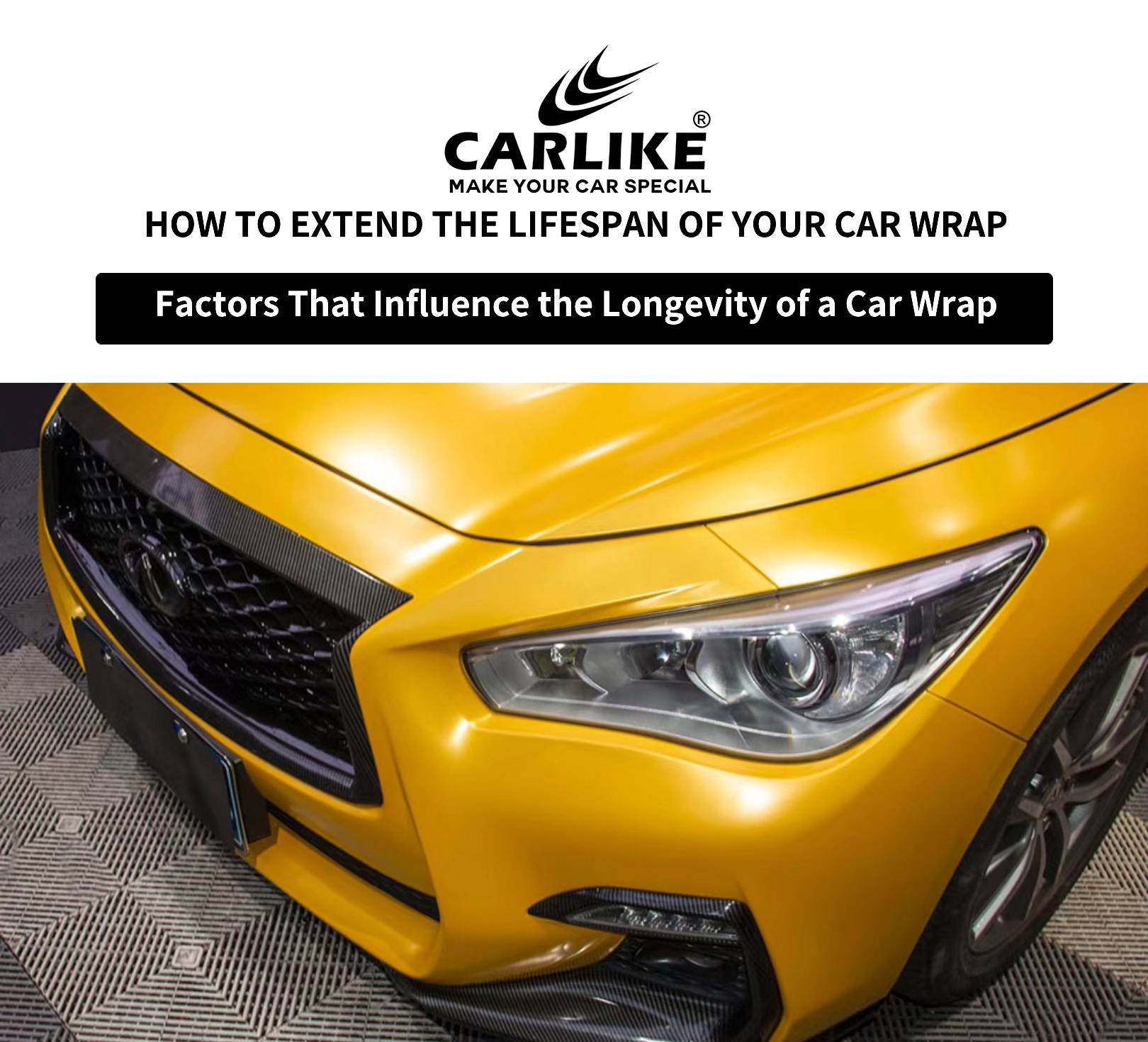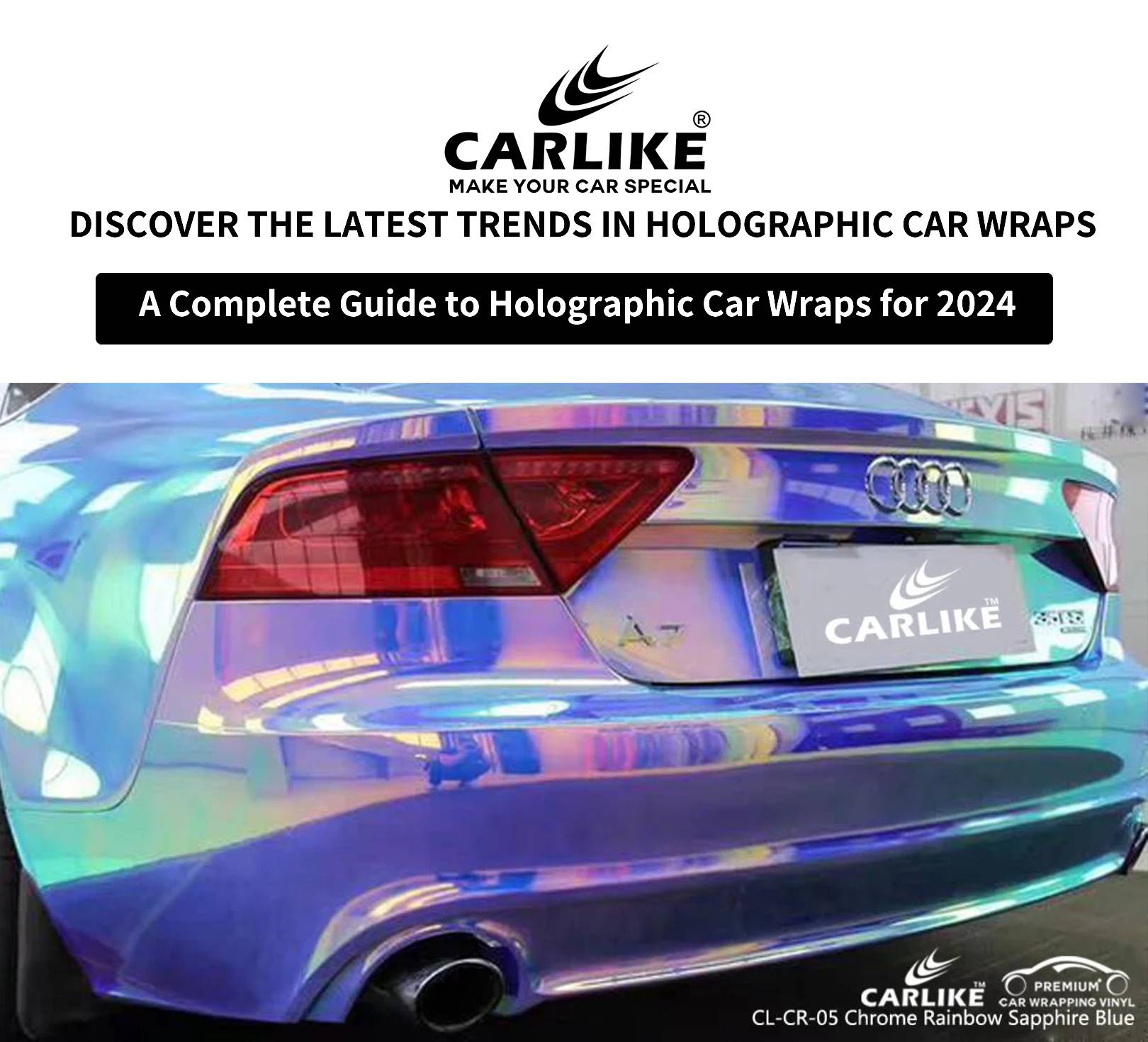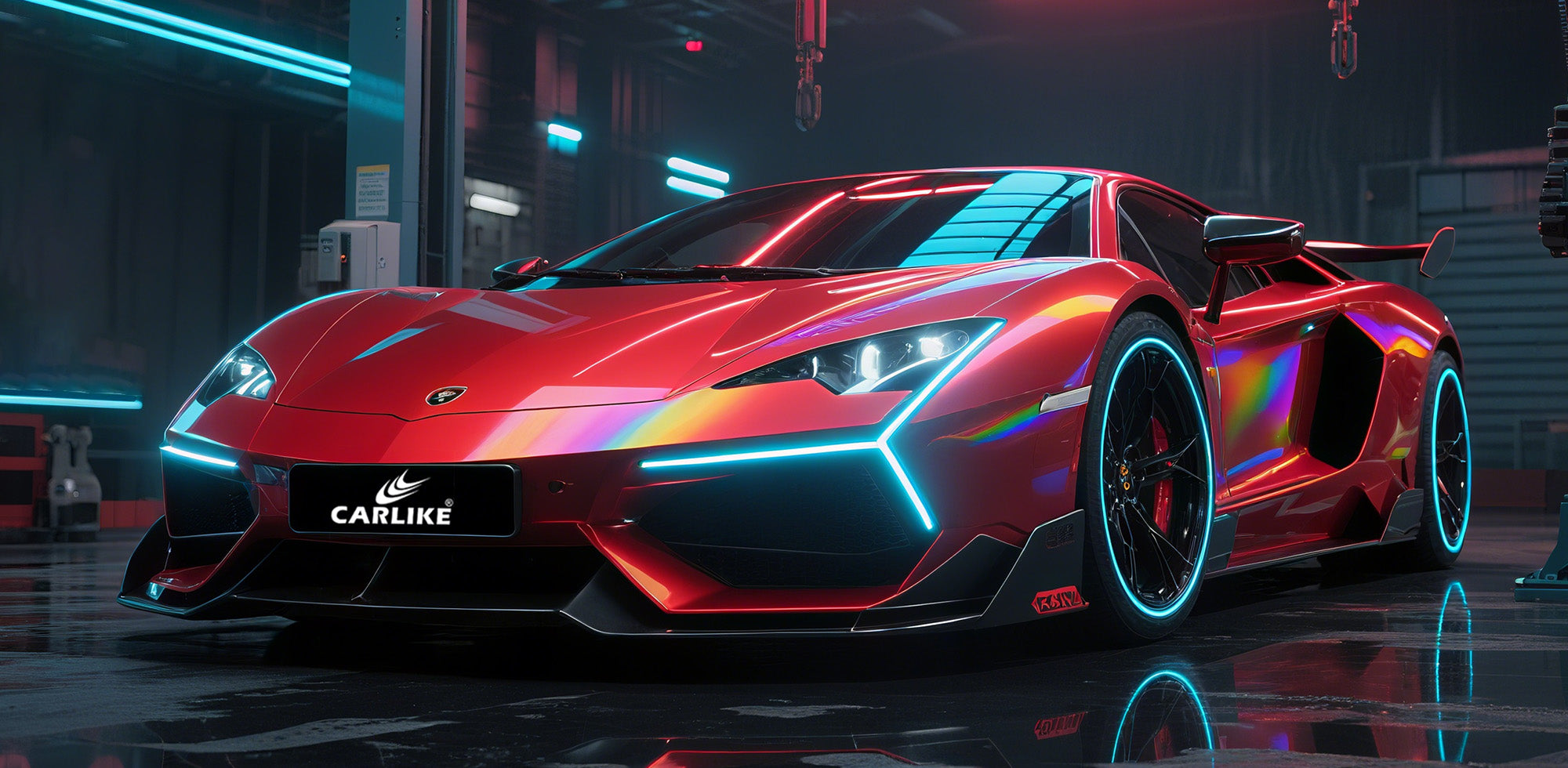Introduction
Car wrapping involves applying a vinyl film to the exterior of a vehicle to change its appearance. This customization method has gained popularity due to its versatility in design, protection it offers to the original paint, and the ability to be easily removed without damaging the paint underneath. Car films come in various colors, textures, and finishes, allowing car owners to achieve unique looks that may not be possible with traditional paint.
Importance of Understanding How Long a Wrap Lasts for Car Owners
Cost Consideration : Car films are a significant investment. Knowing how long a wrap lasts helps car owners assess the value over time compared to the initial cost of installation.
Maintenance Planning : Different films have varying lifespans depending on factors like quality, maintenance, and exposure to elements. Understanding longevity helps owners plan maintenance schedules and care routines to extend the lifespan of their wrap.
Aesthetic Appeal : Over time, films can fade or wear out. Knowing the expected lifespan helps owners anticipate when they might need to refresh or replace the wrap to maintain the vehicle's aesthetic appeal.
Resale Value : For those considering selling their vehicle, knowing the lifespan of the vinyl informs decisions about whether to keep or remove it before sale to enhance resale value.
Warranty Coverage : Some vinyl manufacturers offer warranties based on expected lifespan. Understanding this duration ensures owners are aware of their rights and coverage in case of premature wear or damage.
Want to kow more? Visit our store.
CARLIKE Newest Car Wrapping Vinyl Color Swatch
Factors That Influence the Lifespan of a Car Wrap
External Factors
- Weather : Extreme weather conditions, such as heavy rain, snow, and humidity, can impact the longevity of a car vinyl. In colder climates, snow and ice can cause the vinyl to degrade faster, while high humidity can lead to bubbling or peeling over time.
- Sun Exposure : Prolonged exposure to UV rays causes fading, discoloration, and eventual breakdown of the film material. Cars left in direct sunlight for extended periods are more prone to damage, reducing the wrap’s lifespan.
- Driving Habits : Frequent driving, especially on rough roads or in areas with a lot of debris, can lead to quicker wear. Dust, dirt, and small particles can chip away at the vinyl, while high speeds can cause films to lift or peel at the edges.
Quality of Material
- Vinyl Grade : High-quality vinyl films from reputable manufacturers last longer and offer better resistance to wear and tear. Premium films typically have UV protection and more durable adhesives, ensuring they stay intact for years.
- Durability and Thickness : Thicker vinyl materials tend to be more resistant to damage from external elements like small scratches or road debris. However, thicker films may be harder to apply and may require professional installation for the best results.
Application Method
- Professional Installation : A well-installed vinyl by an experienced professional can significantly extend its lifespan. Proper application ensures a smooth finish, with edges and seams sealed tightly to prevent peeling or air bubbles.
- Surface Preparation : Proper preparation of the car's surface is crucial for film longevity. A clean, smooth, and wax-free surface ensures that the adhesive sticks well and the wrap lasts longer.
- Installation Conditions : The environment where the vinyl is applied also matters. Wraps installed in clean, climate-controlled conditions tend to adhere better and are less likely to have issues such as bubbling or peeling.
RECOMMENDED PRODUCT
-
Color: Silver
Model number: CL-LS-02
Film produce technology: Calendered
Film thickness: 150micron, 6mil(with glue)
Adhesive thickness: 30μm
Durability: 1-3 years
Air bubble free: Yes
Application: Car wrap
Application temperature: From +80°С to +120°С
Temperature resistance: From -40°С to +120°С
How to Maximize the Lifespan of a Car Wrap
To ensure your car film remains in top condition for as long as possible, follow these best practices:
1. Best Practices for Cleaning and Protecting the Wrap
-
Regular Cleaning:Wash your wrapped car regularly to remove dirt, debris, and contaminants that can damage the vinyl. Hand washing is recommended, as automatic car washes with brushes can scratch or peel the film.
- Use Soft Materials : Clean the vinyl with a soft microfiber cloth or sponge to avoid scratching the surface.
- Mild Detergents : Use a gentle, film-safe cleaner or mild soap. Avoid harsh chemicals or abrasive materials that can degrade the vinyl over time.
- Avoid High-Pressure Washing : High-pressure washing can lift or damage the edges of the film. If you use a pressure washer, keep it at a safe distance (around 12-18 inches) and avoid spraying directly at the seams or edges.
- Dry Properly : After washing, dry the car with a soft microfiber towel to prevent water spots. Avoid air-drying in direct sunlight, as this may cause streaking or water marks.
- Park in Shade : Whenever possible, park the car in a garage or shaded area to protect the vinyl from prolonged UV exposure, which can cause fading and deterioration.
- Use a Vinyl-Friendly Wax or Sealant : Apply a wrap-safe, non-abrasive wax or sealant to add an extra layer of protection against the elements. Avoid traditional car waxes that may contain harmful solvents.
2. Tools or Products That Can Extend the Life of the Wrap
-
film Care Products:
- Film-Specific Cleaners : Products like 3M Car Film Cleaner or Turtle Wax Ice Spray Detailer are designed for safe cleaning without damaging the vinyl.
- UV Protectant Sprays : Use UV-protectant sprays, such as Meguiar's Ultimate Quik Wax or Chemical Guys Wrap Detailer, to shield the film from sun damage and maintain its vibrant color.
- Microfiber Towels and Soft Sponges : Always use high-quality microfiber towels and non-abrasive sponges when washing or drying the vehicle to prevent scratching the wrap.
- Edge Sealers : Products like 3M Edge Sealer help protect the wrap's edges from lifting or peeling by sealing them tightly against moisture and contaminants.
- Ceramic Coating for Wraps : Applying a ceramic coating designed for vinyl wraps can add a hydrophobic layer that repels water, dirt, and debris, reducing the need for frequent cleaning while providing additional protection.

"CARLIKE-Make Your Car Special."
PRODUCT ADVANTAGE
SUPER STRETCH
INCREDIBLE RESTORABLE
REMOVABLE GLUE
Signs It’s Time to Replace Your Car Wrap
1. Visual Cues
- Peeling Edges : If you notice the edges of the wrap lifting or peeling, especially around seams, door handles, or corners, it’s a clear sign the adhesive has weakened. This usually occurs due to prolonged exposure to weather elements or improper installation.
- Fading or Discoloration : Fading happens when the wrap has been exposed to UV rays for too long, causing the colors to lose their vibrancy. Discoloration, such as uneven patches, indicates the vinyl has degraded, and it's time for a replacement.
- Cracking or Tearing : Small cracks or tears in the wrap, particularly in high-impact areas like the hood or fenders, signal that the material has worn out and is no longer providing adequate protection or aesthetics.
- Bubbling : Air bubbles that form under the wrap are a sign of poor installation or aging material. If the bubbling is widespread, it means the adhesive is failing, and the wrap needs to be replaced.
- Stubborn Stains : Stains from tree sap, bird droppings, or harsh chemicals that won’t come off during cleaning indicate that the wrap's protective layer is compromised.
2. Evaluating if It's Still Worth Keeping
- Extent of Damage : If the issues like peeling or fading are localized to small areas, such as a door or bumper, you might be able to repair or patch the affected sections. However, if the damage is widespread, replacing the entire wrap is more practical.
- Wrap Age : Most high-quality wraps last between 5 to 7 years. If your wrap is approaching or exceeding that age, it's worth considering a replacement to prevent further wear that might damage the car's paint.
- Appearance vs. Protection : Evaluate the wrap’s function—if it’s heavily faded or cracked, not only is the visual appeal diminished, but its protective qualities are likely compromised as well. If both aesthetics and protection are affected, replacement is the better option.
- Cost of Repair vs. Replacement : In some cases, repairing minor damage may cost almost as much as a full replacement, especially if large sections are affected. Consider whether the costs justify the continued use of an aging wrap or if a fresh wrap would be more worthwhile.

ABOUT CARLIKE
CARLIKE® launched in 2012, mainly focus on premium car wrapping vinyls, with rich colors and stylish designs. High performance with economic price is always the persuit of CARLIKE®.
CARLIKE-Make Your Car Special.
Cost vs. Longevity: Car Wrapping vs. Repainting
1. Initial Costs
- Car Wrapping : The average cost of a professional car wrap ranges from $2,000 to $5,000 , depending on the quality of the vinyl, size of the vehicle, and complexity of the design. Higher-end materials like chrome or specialty finishes will be more expensive.
- Repainting : A professional car paint job can cost anywhere from $1,000 to $10,000 , depending on the quality of the paint and the amount of labor involved. Custom or premium finishes push the cost towards the higher end.
2. Longevity and Durability
- Car Wrapping : Vinyl wraps typically last 5 to 7 years with proper care. High-quality wraps may last longer but are prone to fading and wear from sun exposure, road debris, and weather. Wrapping is ideal for those who may want to change the appearance of their vehicle frequently, as it can be removed or replaced more easily than paint.
- Repainting : A professional paint job, particularly high-quality paint with proper clear coat application, can last 10 to 15 years or longer with proper care. Paint is more permanent than a wrap and is designed to withstand elements longer without the same level of fading or wear.
3. Cost Over Time
-
Car Wrapping:
- Over a 10-year period , if you replace the wrap after 5-7 years, you may pay for 2 wraps , totaling around $4,000 to $10,000 .
- However, a wrap provides additional protection to the underlying paint, potentially saving on paint repair or restoration costs, especially for luxury or older cars.
-
Repainting:
- A single high-quality paint job over a similar 10-year period can range from $3,000 to $10,000 , but this will likely last the full duration with minimal maintenance.
- Lower-cost paint jobs may need touch-ups or refinishing earlier, especially in harsher climates or with frequent use.
4. Maintenance Costs
-
Car Wrapping:
- Wraps require regular maintenance to extend their lifespan, such as hand washing, avoiding harsh chemicals, and applying UV protectants. Minor repairs for peeling or bubbling may also add to the cost.
- Over time, replacing wraps may include labor and removal costs, especially if the wrap has adhered strongly to the car’s surface.
-
Repainting:
- Paint requires occasional polishing, waxing, and touch-ups. However, it generally needs less day-to-day maintenance compared to vinyl wraps.
- While paint can chip or fade over time, proper care and periodic touch-ups can extend its appearance without major additional costs.
5. Long-Term Savings
-
Car Wrapping:
- Flexibility : Wraps are ideal for those who like to update their car’s look frequently. Over time, this flexibility can be seen as a benefit, especially when factoring in the cost of reselling the vehicle with well-maintained original paint underneath.
- Protection : A wrap protects the original paint from UV rays, scratches, and minor damage, preserving the vehicle’s resale value.
-
Repainting:
- Durability : While more expensive upfront, a high-quality paint job is durable and may need fewer changes over time, translating to long-term savings.
- Less Frequent Touch-Ups : A good paint job, paired with regular care, will last much longer without needing replacement, potentially saving costs in the long run.
Conclusion
- Car Wrapping is ideal for car owners who value flexibility in customization and want to protect the original paint, even if it requires more frequent maintenance and periodic replacement.
- Repainting , while potentially more expensive upfront, offers a long-lasting solution with less frequent maintenance needs, making it cost-effective over a longer period for those seeking durability and a permanent finish.
RECOMMENDED PRODUCTS
“CARLIKE-Make Your Car Special.”
Related readings
Ready to elevate your skincare game?







